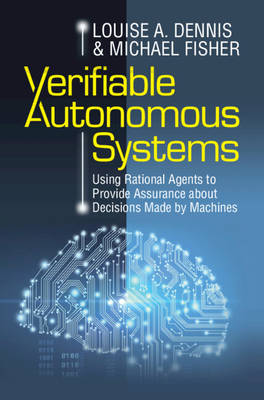
- Afhalen na 1 uur in een winkel met voorraad
- Gratis thuislevering in België vanaf € 30
- Ruim aanbod met 7 miljoen producten
- Afhalen na 1 uur in een winkel met voorraad
- Gratis thuislevering in België vanaf € 30
- Ruim aanbod met 7 miljoen producten
Zoeken
Verifiable Autonomous Systems
Using Rational Agents to Provide Assurance about Decisions Made by Machines
Louise A Dennis, Michael Fisher
Hardcover | Engels
€ 129,95
+ 259 punten
Omschrijving
How can we provide guarantees of behaviours for autonomous systems such as driverless cars? This tutorial text, for professionals, researchers and graduate students, explains how autonomous systems, from intelligent robots to driverless cars, can be programmed in ways that make them amenable to formal verification. The authors review specific definitions, applications and the unique future potential of autonomous systems, along with their impact on safer decisions and ethical behaviour. Topics discussed include the use of rational cognitive agent programming from the Beliefs-Desires-Intentions paradigm to control autonomous systems and the role model-checking in verifying the properties of this decision-making component. Several case studies concerning both the verification of autonomous systems and extensions to the framework beyond the model-checking of agent decision-makers are included, along with complete tutorials for the use of the freely-available verifiable cognitive agent toolkit Gwendolen, written in Java.
Specificaties
Betrokkenen
- Auteur(s):
- Uitgeverij:
Inhoud
- Aantal bladzijden:
- 410
- Taal:
- Engels
Eigenschappen
- Productcode (EAN):
- 9781108484992
- Verschijningsdatum:
- 8/06/2023
- Uitvoering:
- Hardcover
- Formaat:
- Genaaid
- Afmetingen:
- 152 mm x 229 mm
- Gewicht:
- 689 g

Alleen bij Standaard Boekhandel
+ 259 punten op je klantenkaart van Standaard Boekhandel
Beoordelingen
We publiceren alleen reviews die voldoen aan de voorwaarden voor reviews. Bekijk onze voorwaarden voor reviews.











